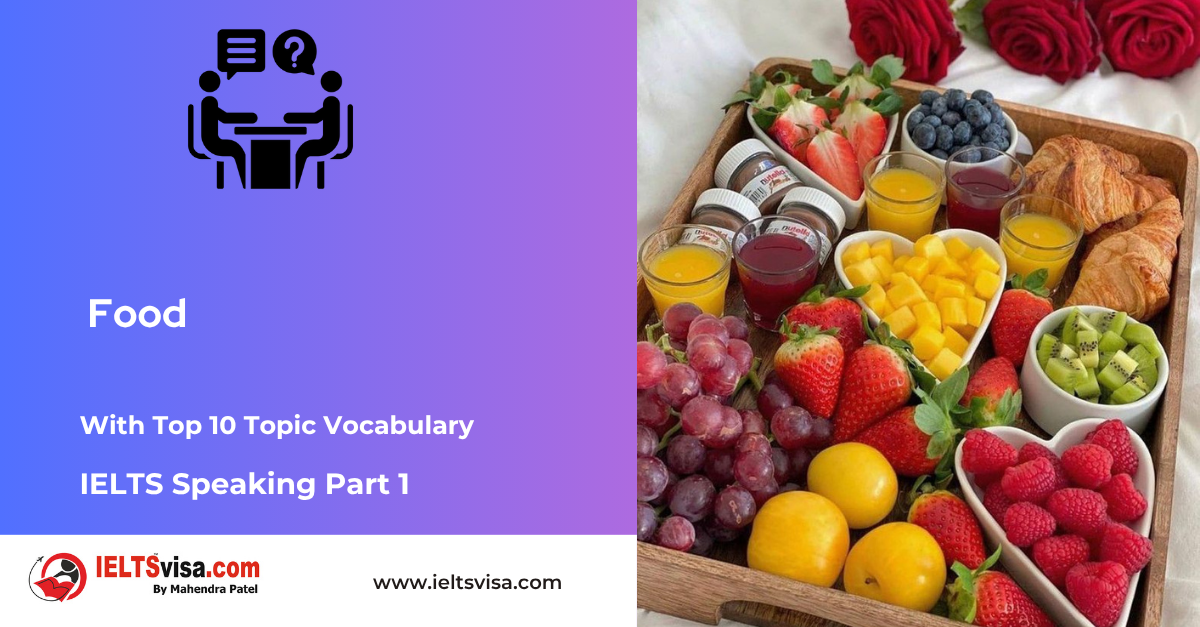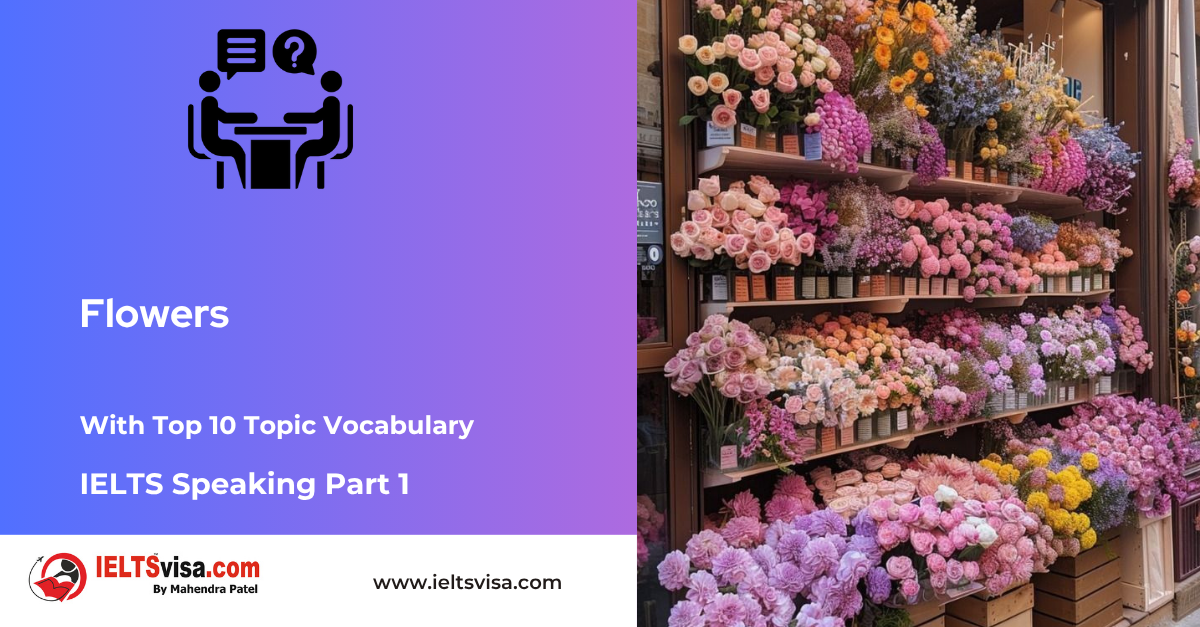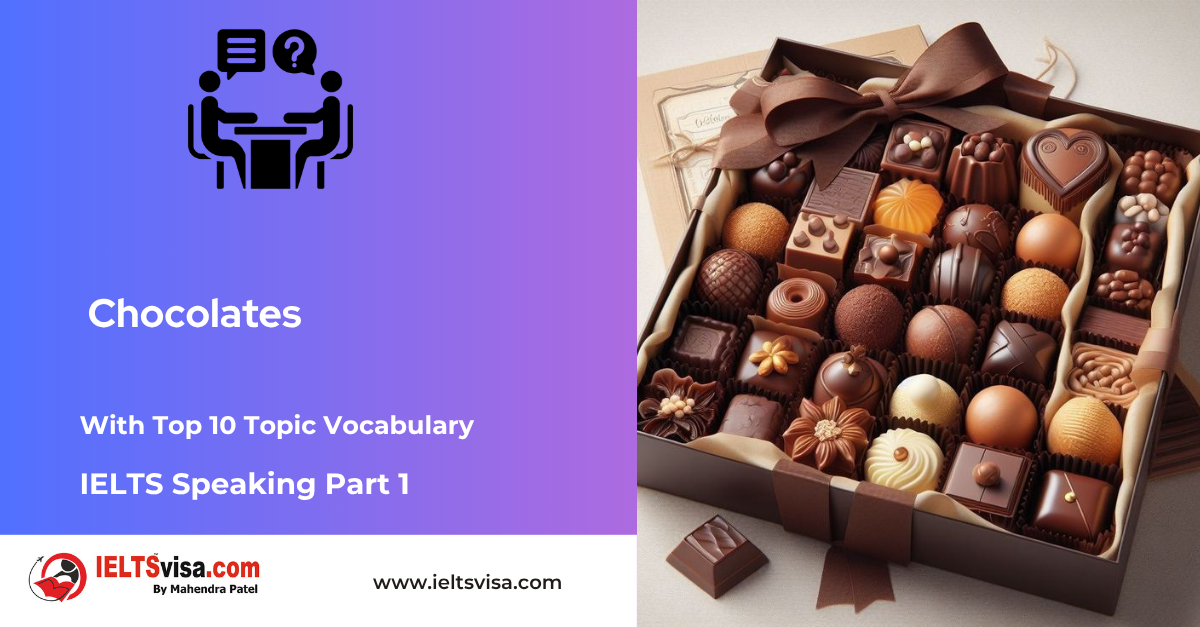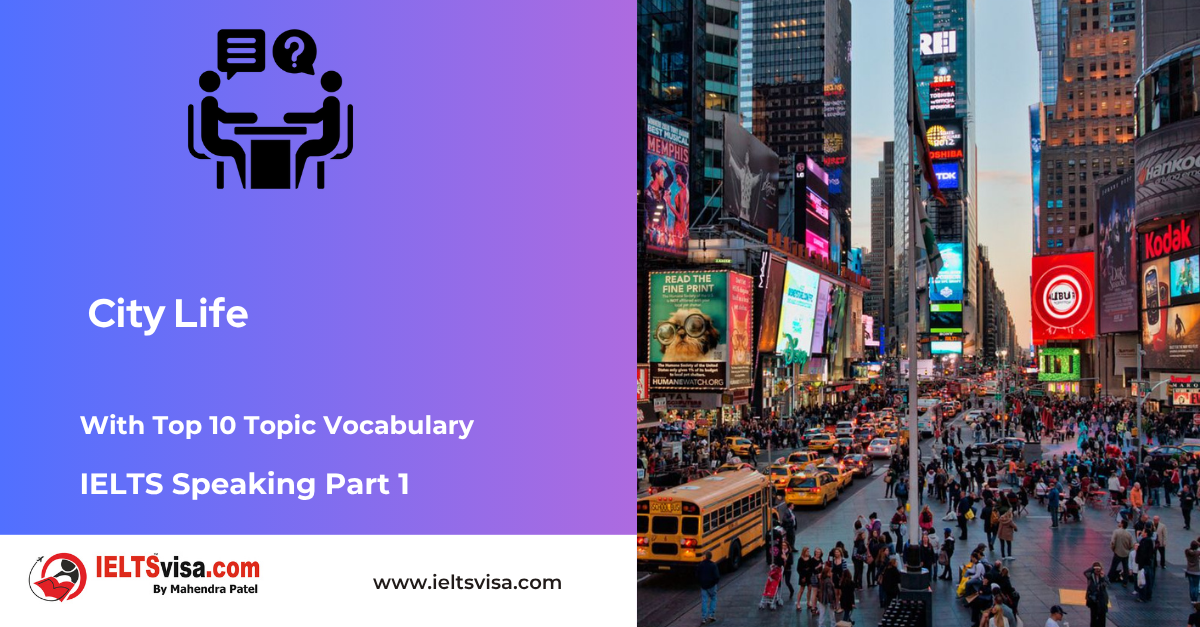IELTS Speaking Part 1 – Food
IELTS Speaking Practice
IELTS Speaking Part 1 – Food
Examiner: What kind of food do you enjoy eating the most?
Candidate: I’m a big fan of flavourful Indian dishes. I love the bold spices and fresh ingredients that make this cuisine so delicious.
Examiner: Do you prefer to cook your own meals or eat out?
Candidate: I enjoy both! Cooking at home allows me to control the ingredients and customize dishes. But eating out can be a fun way to try new cuisines and flavours.
Examiner: Who usually does the cooking in your home?
Candidate: The cooking duties in my household are shared. During the week, I usually cook simple meals for myself. Still, on weekends, we often have family dinners where everyone contributes. My dad cooks Indian dishes, while my mom makes fantastic side dishes and salads. It’s fun to spend time together and enjoy a delicious homemade meal.
Examiner: When you cook at home, do you follow recipes or improvise?
Candidate: I sometimes follow recipes for inspiration, especially when trying a new dish. But I also enjoy improvising in the kitchen and adding my touch to familiar recipes.
Examiner: What’s your favourite meal of the day?
Candidate: It depends on my mood! Sometimes, I crave a light, healthy breakfast with fruits and yoghurt to start the day. In contrast, I look forward to a more substantial dinner with protein and vegetables on other days.
Examiner: Do you think it’s essential to have a healthy diet?
Candidate: Absolutely! A healthy diet gives our bodies the nutrients they need to function correctly. It can also boost our energy levels and improve overall well-being.
Examiner: Do you have any dietary restrictions?
Candidate: No, I don’t have any specific dietary restrictions. However, I try to maintain a balanced diet and limit unhealthy processed foods.
Examiner: Have you ever tried any unusual or exotic foods?
Candidate: Yes, I’m always open to trying new things! The most unusual food I’ve tried might be durian, and it was surprisingly delicious, though the smell was quite strong.
Examiner: In your culture, is a specific food associated with celebrations?
Candidate: In my culture, roast turkey is often served during festive holidays like Thanksgiving. It’s a traditional dish that brings people together and holds special meaning for many.
Examiner: Do you think food can connect people from different cultures?
Candidate: Absolutely! Sharing a meal is a universal way to connect with people. Food can be a conversation starter, a way to learn about different cultures, and a chance to experience new flavours and traditions.
Examiner: How important is food to you?
Candidate : Food is more than fuel for my body. It’s a source of enjoyment, a way to connect with others and explore different cultures.
Examiner: Do you have any hobbies or activities related to food?
Candidate : Yes, I enjoy a few things related to food! I sometimes try baking new recipes on the weekend, which can be a fun way to relax and experiment with flavours. I love exploring new restaurants and cuisines, especially with friends or family. It’s a great way to discover hidden gems and broaden my culinary horizons.
Examiner: Do you think food waste is a serious issue?
Candidate : Absolutely, food waste is a primary concern. A significant amount of food gets wasted globally, while many people suffer from hunger. We can all play a part by planning meals effectively, buying only what we need, and storing food properly to reduce waste.
Examiner: How important is it for people to learn about the origin of their food?
Candidate : Understanding where your food comes from can be precious. Knowing the farming practices, source of ingredients, and overall sustainability of your food allows you to make informed choices and support ethical food production.
Examiner: Do you think food trends come and go too quickly?
Candidate : Food trends can be fun and exciting, introducing new flavours and ingredients. However, sometimes, they can overshadow traditional dishes and local cuisines. Finding a balance between embracing new trends and appreciating established culinary traditions is crucial.
Examiner: How do you think technology is changing how we experience food?
Candidate : Technology is having a significant impact on the food world. From online food ordering and delivery apps to recipe websites and social media food trends, technology is making food more accessible and interactive. It’s also allowing people to connect with food producers and learn more about the food they eat.
Examiner: Do you watch cookery programmes on TV?
Candidate : Actually, I don’t watch them too often. While I appreciate the creativity and skill of some chefs, I find following recipes online more practical. There’s a wider variety of cuisines to explore, and I can adjust the ingredients to my taste.
Examiner: What do you think of fast food?
Candidate : Fast food can be convenient, especially on busy days. However, I try to limit my intake because it’s often high in calories, fat, and sodium. It’s not the best choice for a balanced diet. If I have a fast-food craving, I try to opt for healthier options like grilled chicken salads.
Examiner: Which meal of the day do you consider to be the most important?
Candidate : For me, breakfast is the most important meal. It gives me the energy to start the day and helps me focus throughout the morning. I usually have oatmeal with fruit and nuts, which keeps me feeling full until lunchtime.
Examiner: How about trying new foods?
Candidate : I absolutely love trying new foods! It’s a great way to experience different cultures and broaden your culinary horizons. There’s always something new to discover; sometimes, the most unexpected flavours become your favourites.
Examiner: Do you have any special dietary requirements?
Candidate : No, I don’t have any specific dietary restrictions. However, I try to maintain a balanced diet and limit processed foods. I believe in eating various healthy options to get all the nutrients my body needs.
Examiner: What are some of the traditional dishes in your country?
Candidate : That depends on the specific region, but some popular dishes in my country include (mention a few traditional dishes). These dishes often use fresh, local ingredients and have been passed down through generations. They offer a delicious glimpse into the culinary heritage of our country.
Examiner: Is there a food you dislike?
Candidate : I don’t actively dislike many foods, but I’m not a massive fan of overly spicy dishes. I appreciate the heat in some curries, but it becomes less enjoyable when it overpowers the other flavours.
Examiner: How has the way you eat changed over the years?
Candidate : As I’ve gotten older, I’ve become more conscious about healthy eating. I used to snack on sugary treats more often, but now I focus on including more fruits, vegetables, and whole grains. I also try to cook at home more frequently to control the ingredients and portion sizes.
Examiner: Do you think food is an integral part of culture?
Candidate : Absolutely! Food is a fundamental part of any culture. It reflects the local ingredients, traditional cooking methods, and even social customs. Sharing meals is a way to connect with family, friends, and community. Exploring different cuisines allows us to learn about other cultures and appreciate their unique flavours and traditions.
Examiner: Where would you go if you could travel to any country to get its food?
Candidate : Many fantastic food destinations exist, but I’ve always been curious about Japanese cuisine. The focus on fresh, seasonal ingredients and the emphasis on presentation seem fascinating. I’d love to try traditional dishes like sushi, tempura, and ramen in their authentic forms.
Examiner: What role does food play in celebrations in your culture?
Candidate : Food plays a central role in celebrations. Unique dishes are prepared for holidays and festivals, bringing people together and creating a shared experience. For example, (mention a specific example from your culture).
Examiner: Do you think learning to cook is an important skill?
Candidate : Absolutely! Knowing how to cook offers numerous benefits. It allows you to prepare healthy and delicious meals tailored to your preferences. Cooking at home can also be a fun and creative activity, and it’s a practical skill that can save you money compared to eating out frequently.
Examiner: Have you ever tried growing your own food?
Candidate : I haven’t had the opportunity yet, but I’m interested in someday growing some herbs or vegetables at home. The idea of enjoying fresh produce straight from your own garden seems very rewarding. It could also be an excellent way to learn more about where our food comes from and appreciate the effort in growing it.
Examiner: Do you think food trends have a positive or negative impact?
Candidate : Food trends can have both positive and negative effects. On the positive side, they can introduce people to new ingredients and cuisines, encouraging exploration and creativity in the kitchen. However, some trends might focus on aesthetics over nutrition or encourage excessive consumption. It’s essential to be critical of food trends and focus on developing healthy and sustainable eating habits.
Examiner: In your opinion, what makes a meal truly special?
Candidate : For me, an exceptional meal goes beyond just the taste of the food. It’s about the atmosphere, the company you share it with, and the memories created. Whether it’s a carefully prepared dish enjoyed with loved ones or a simple meal shared with good conversation, the experience and connection make it truly special.
Top 10 Topic Vocabulary for “Food”
|
Vocabulary |
Type |
Meaning |
Synonyms |
Antonyms |
Word Family |
Example Sentences |
|
Culinary |
Adjective |
Relating to cooking or the kitchen |
cooking, kitchen, food |
culinary |
I enjoy exploring different culinary traditions. I love to try different culinary traditions from around the world. |
|
|
Nostalgia |
Noun |
A sentimental longing for the past |
yearning, hankering, wistfulness |
nostalgic |
Food can evoke nostalgia. Certain foods can remind me of happy memories and evoke feelings of nostalgia. |
|
|
Sustainability |
Noun |
The ability to be maintained at a certain level without compromising future generations’ ability to meet their own needs |
environmentally friendly, eco-friendly, green |
sustainable |
Choose sustainable food options. I try to choose food options that are sustainable and environmentally friendly. |
|
|
Aesthetic |
Adjective |
Relating to or concerned with beauty |
artistic, beautiful, visually |
aesthetically |
Food can be aesthetically pleasing. The presentation of food can be essential to me. |
|
|
Diverse |
Adjective |
Showing a variety of different things |
varied, various, assorted |
diversity |
There is a diverse range of cuisines to explore. There are many different cuisines to explore and enjoy. |
|
|
Savoury |
Adjective |
Having a pleasant, salty or spicy taste |
flavorful, tasty, delicious |
savour |
I enjoy savoury dishes. I prefer savoury dishes with a lot of flavor. |
|
|
Fusion |
Noun |
A combination of two or more different things |
blend, mixture, combination |
fuse |
Fusion cuisine offers a unique blend of flavours. Fusion cuisine combines elements from different culinary traditions. |
|
|
Gourmet |
Adjective |
Relating to or for people with a particular interest in food and drink |
fine dining, gourmet |
gourmet |
I enjoy trying gourmet food. I love to try gourmet restaurants and dishes. |
|
|
Indulge |
Verb |
Allow oneself to enjoy something that one likes very much |
pamper, spoil, gratify |
indulgence |
Sometimes, I indulge in my favourite dessert. Sometimes, I allow myself to indulge in my favourite dessert. |
|
|
Culinary tourism |
Noun |
The practice of travelling to experience different food cultures and cuisines |
food tourism, gastronomic tourism |
culinary |
Culinary tourism is becoming increasingly popular. People are increasingly travelling to experience different food cultures. |

Our Books
Master IELTS Speaking Part 1
IELTS Writing Task 1 Book
IELTS Writing Task 2 Book
Practice IELTS Other Modules
IELTS Listening
The IELTS Listening test assesses how well you can understand spoken English in various contexts. It lasts about 30 minutes and is divided into four sections with a total of 40 questions. The listening tasks become increasingly difficult as the test progresses.
IELTS Academic Reading
The IELTS Academic Reading section assesses your ability to understand and interpret a variety of texts in academic settings. It is designed to evaluate a range of reading skills, including skimming for gist, reading for main ideas, reading for detail, understanding inferences, and recognizing a writer's opinions and arguments.
IELTS Speaking
The IELTS Speaking test assesses your ability to communicate in English on everyday topics. It lasts 11-14 minutes and consists of three parts: introduction, cue card, and a discussion based on the cue card topic.
IELTS General Reading
IELTS General Reading tests your ability to understand and interpret various types of texts. Here are some key areas and types of content you can expect to encounter in the reading section, along with tips for effective preparation.
IELTS Academic Writing Task 1
In IELTS Academic Writing Task 1, you are presented with a visual representation of information, such as graphs, charts, tables, or diagrams, and you are required to summarize, compare, or explain the data in your own words.
IELTS General Writing Task 1
In IELTS General Writing Task 1, you are required to write a letter based on a given situation. The letter can be formal, semi-formal, or informal, depending on the prompt. Here’s a breakdown of the key components to include in your letter
IELTS Academic Writing Task 2
In IELTS Academic Writing Task 2, you are required to write an essay in response to a question or topic. Here’s a guide to help you understand the essential elements of this task
IELTS Exam Tips
To succeed in the IELTS exam, practice regularly, familiarize yourself with the test format, improve your vocabulary, develop time management skills, and take mock tests to build confidence.
Grammer for IELTS
Grammar is the foundation of effective communication in English. Understanding tense usage, subject-verb agreement, and sentence structure enhances clarity and coherence in writing and speaking.
Vocabulary for IELTS
Vocabulary plays a crucial role in the IELTS (International English Language Testing System) exam, especially in the Speaking and Writing sections. Here’s an overview of why vocabulary is important and how it impacts your performance
RECENT IELTS SAMPLES QUESTIONS AND ANSWERS
IELTS Speaking Part 1 – Favourite Subject – Math
IELTS Speaking Part 1 - Favourite Subject – Math Examiner: What is your favourite subject? Candidate: My...
IELTS Speaking Part 1 – Favourite Subject – Science
IELTS Speaking Part 1 - Favourite Subject – Science Examiner: What is your favourite subject? Candidate:My...
IELTS Speaking Part 1 – Flowers
IELTS Speaking Part 1 - Flowers Examiner: Do you like flowers?Candidate: Absolutely! I find flowers incredibly...
IELTS Speaking Part 1 – Foreign Language
IELTS Speaking Part 1 - Foreign Language Examiner: Do you speak any foreign languages?Candidate: Yes, I speak...
IELTS Speaking Part 1 – Chocolate
IELTS Speaking Part 1 - Chocolate Examiner: Do you like chocolate?Candidate: I love chocolate. It’s one of my...
IELTS Speaking Part 1 – City Life
IELTS Speaking Part 1 - City Life Examiner: Do you like living in a city?Candidate: Yes, I enjoy living in a...













